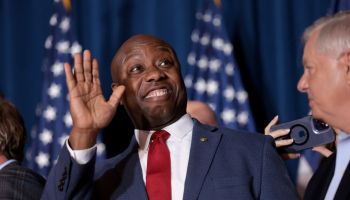The assassination of a top Iranian official by a U.S.-sanctioned military strike on Thursday brought the two countries closer to an all-out war, perhaps by design.
With President Donald Trump seemingly at his most vulnerable while facing a looming impeachment trial and low approval numbers during an election year, there are fears that he may have been thinking of his own political future when he authorized the killing of Qasem Soleimani, the commander of Iran’s Islamic Revolutionary Guards Corps Quds Force.
Whether those fears are rooted in fact or not, the assassination of a foreign official in a foreign sovereign country has now put the American people in imminent danger. The Washington Post reported that Iran’s supreme leader, Ayatollah Ali Khamenei, has vowed “revenge” for “those criminals who have tainted their filthy hands with his blood and the blood of the other martyrs of last night’s incident.”
The U.S. military strike via drone near an airport in Baghdad was a serious escalation of tensions with a formidable and underestimated power in the Middle East. The assassination also came on the heels of pro-Iranian militias attacking the U.S. embassy in Baghdad last week, prompting Trump to tweet that “Iran will be held fully responsible for lives lost, or damage incurred, at any of our facilities. They will pay a very BIG PRICE! This is not a Warning, it is a Threat.”
Both attacks from each Iran and the U.S. were tantamount to acts of war, political analysts said.
So did Trump authorize the assassination to distract the country from his failing presidency and looming impeachment while also stoking his pro-military base of supporters in the months ahead of the 2020 general election? Distractions seem to be Trump’s thing, so, of course, no one can rule out that possibility. That said, however, it seems doubtful, according to one respected study about “the diversionary theory of war” published in 2009.
“According to the diversionary theory of war, unpopular leaders generate foreign policy crises to both divert the public’s attention away from the discontent with their rule and bolster their political fortunes through a rally around the flag effect,” Jaroslav Tir wrote in the Journal of Politics before continuing later: “Because people tend to react to territorial issues intensely, the embattled leader could attempt to manipulate and exploit this proclivity by launching specifically a territorial conflict. By linking government unpopularity with the initiation of militarized territorial conflicts and crises in a global sample of countries, this territorial diversion argument receives strong empirical support.”
But a past tweet from Trump about his predecessor Barack Obama was quite telling and may provide a glimpse into what was going through the president’s mind when he authorized the drone strike on Soleimani.
The bottom line remains that no wartime president has ever lost his bid for re-election. Considering Trump’s documented history of launching distractions, it would be naive to think that Trump is unaware of that fact amid the uncertainty of his impeachment trial and months ahead of the 2020 election.
SEE ALSO:
John Gray Addresses His Church’s Possible Eviction Over Lease ‘Payment Amounts’
Marriott’s Racist ‘No Party Policy’ Lawsuit Highlights Portland’s Poor Race Relations
















